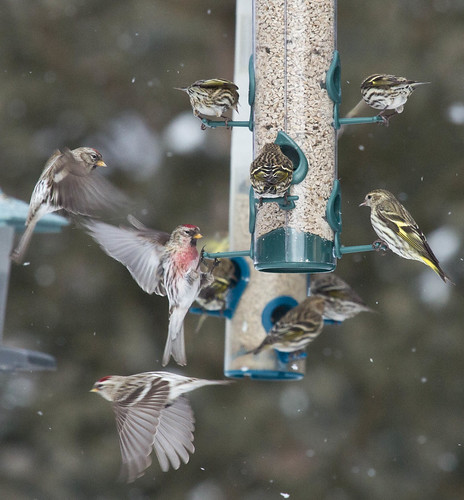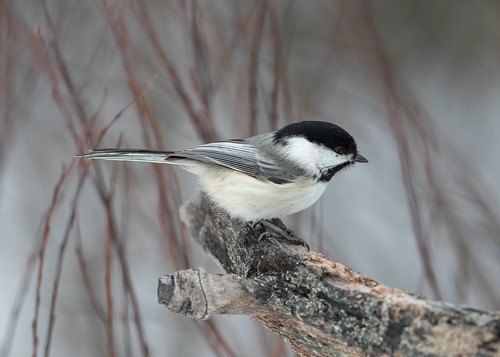This winter has been one of the poorest I can remember for winter finches. I had a few goldfinches back in December, but haven’t had a single siskin, redpoll, Pine or Evening Grosbeak, or Purple Finch in my yard all season. It’s probably just as well—as we adjust to the concept of social distancing, it might be disconcerting to look at these excessively sociable birds that crowd into feeders to pig out shoulder to shoulder.
That inability to keep any distance between themselves is why redpolls and siskins often succumb to salmonella and botulism at feeders—when one bird is sick, others feeding near it are also vulnerable.
Woodpeckers, nuthatches, and chickadees—the only feeder birds I’ve been seeing this year—are very protective of their personal space. Robins join together in big numbers at some fruit trees in winter, but the ones arriving here in the Northland now are in spring territorial mode, so we’ll see them social distancing as well.
I have shut down the BSBO headquarters to any visitation - even personnel. I'm the only one coming in because we have a cat and someone needs to take in the mail. This post is based on brief observations from yesterday and today.
As much as this pains my heart, I think they need to close wildlife areas and parks where people are gathering. Under normal circumstances, the number of people going in and out of Magee today wouldn't even register. But seeing so many people going in and out of portable toilets, many that I observed NOT following any kind of hygiene protocol, is disturbing. The Refuge Wildlife Drive is open, but no bathrooms. I understand why, but the fact that these areas are a LONG way from restroom facilities means people are forced to use whatever facilities are open. I’ve also observed people gathered together, standing outside their cars, not following the six-foot social distancing protocol. These areas are bringing people together when that presents a real risk.
I think we're at the point were we need to shut these areas down and urge people to stay home and shelter in place. And if anyone seeing this message is thinking of going out today, please stay home.Some of us have backyards and/or live on streets that allow us to get out while keeping a safe distance from others. And some people know of secret little spots that don’t attract other people. We should leave what parks and wildlife refuges are open to people who don’t have those options. In a pandemic, we have a fundamental responsibility to look out for one another. Chickadees are right this moment social distancing in our own backyards. Let's look to them to show us the way.



